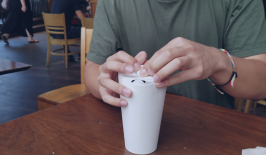Coffee is a part of the culture in large parts of the world. Whether it’s in the morning, at lunch break or in the afternoon, a coffee break is an integral part of the day for most of us. Europe accounts for around 33% of the global coffee consumption – approximately 3,222 thousand tonnes of coffee a year – and that means many tons of discarded coffee grounds too. While some of ends up in plant pots as fertilizer or in our bathrooms as homemade body scrubs, most of it simply ends up in the bin. It’s a huge waste of a valuable resource. But it doesn’t have to be that way. Innovators around the world are turning the leftovers from our caffeine-fix into something new. Here are just a few of the ways that coffee grounds are contributing to the circular economy.
Nutrition for Italian Mushroom Farms
In Florence, Italy, one group of ecopreneurs has come up with a particularly creative idea: Funghi Espresso uses coffee grounds as a substrate for growing various edible mushrooms. Due to the high concentration of minerals and nutrients in the coffee and the fact that the mushrooms are grown in nets hung from the ceiling, the mushrooms can grow in a way that saves both resources and space. The finished product is then sold to restaurants. And it’s an idea that works on a smaller scale too: the company has developed home kits that you can use to cultivate mushrooms at home from your own used coffee grounds. The project is inspired by the concept of the Blue Economy, which aims to protect the earth’s natural ecosystems and create jobs at the same time. Residues from a product’s life-cycle aren’t seen as waste, but instead reused.
An Environmentally-Friendly Alternative to Palm Oil
Two entrepreneurs from Glasgow have come up with another creative idea for how to use coffee grounds both profitably and sustainably. They collect discarde coffee grounds from cafés and offices, transport them to a recycling plant and process them there into a versatile oil. What makes this process particularly noteworths is that the oil produces has the same components as palm oil, meaning it could be used as a truly sustainable alternative to palm oil in the food and pharmaceutical industries. RESET spoke to Fergus Moore, one of the founders of the project, about the current status and his plans for the future.
Shoes Made of Coffee and Recycled Plastic
The idea of coffee grounds as a sustainable material has also been picked up by the radar of the fashion industry. The Finnish startup Rens has developed a hard-wearing yarn from a mixture of coffee grounds and recycled plastic, which it plans to use to make a line of sneakers. The mixture of the two materials gives the shoe both water- and odour-resistant properties. The sneakers are currently in the development phase and will be launched at the beginning of next year.
Giving a Whole New Meaning to the Term “Coffee Cup”
Another idea for how to reuse coffee grounds comes from Berlin: The company Kaffeeform has come up with a way of processing the raw material into cups. And the entire production process is designed to be as sustainable as possible. Bicycle couriers travel around Berlin, collecting up the coffee grounds from Berlin cafés and roasting plants and take them to the Kaffeeform workshop. There the material is processed before next being assembled into cups by small German businesses. The finished product is available both as a to-go cup and in various different sizes of coffee cup.
Replacing Wood With Coffee
In the USA, the company Pine Mountain was able to establish a special product years ago: A “firelog” made from coffee grounds. The block was designed as a fuel for the fireplace or stove and even releases a pleasant aroma while it burns. (And if the internet’s many DIY websites are to be believed, if you have enough coffee grounds at home, you can even try making a firelog yourself with just a few ingredients.)
Coffee grounds are quite clearly anything but waste; they are a raw material that is available in huge quantities and can be recycled and reused in myriad different ways. The examples above are evidence that it can play a key part in contributing to the circular economy – even being repurposed into new, eco-friendly products with sustainable added value. And that’s for sure not to be the end of the potentials for recycling coffee grounds, so watch this space…
This a translation by Marisa Pettit of an article which originally appeared on RESET’s German-language site.





